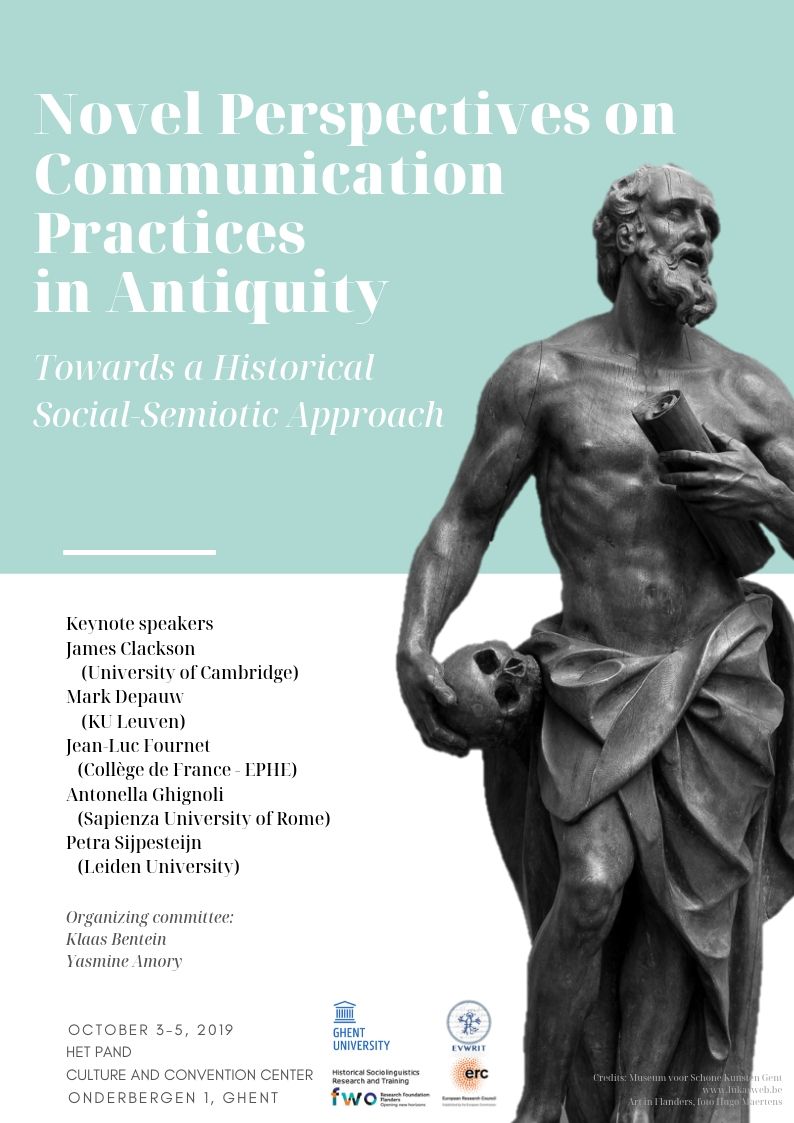>> Organization
Initiative and organization: Berenice Verhelst (Ghent)
Other members of the organizing and scientific committees: Kristoffel Demoen (Ghent), Koen De Temmerman (Ghent), Fotini Hadjittofi (Lisbon), David Hernández de la Fuente (Madrid), Johan Leemans (Leuven), Anna Lefteratou (Heidelberg), Rachele Ricceri (Ghent) Tine Scheijnen (Ghent), Peter Van Deun (Leuven).
Programme
Thursday the 19th of April
9:00-9:30: registration and coffee
9:30: welcome and introduction (Berenice Verhelst)
9:50: hommage à Pierre Chuvin (†26/12/2016) (Gianfranco Agosti)
(full text)
10:00-11:00: keynote 1 (chair: Koen De Temmerman)
Tim Whitmarsh (Cambridge): Big Data and the Dionysiaca
11:00-11:30: coffee break
11:30-13:00: panel 1: the road to the East (chair: Katherine La France)
Richard Stoneman (Exeter): Nymphs and Elephants: Nonnus’ Depiction of India in the Dionysiaca
Fotini Hadjittofi (Lisbon): Nonnus’ Indians between Conversion and Acculturation
Luise Marion Frenkel (São Paolo): Spicing Nonnus up: commercial and religious crossroads and Nonnus’ representation of the East
13:00-14:00: lunch
14:00-15:30: panel 2: Late Antique intersections (part 1) (chair: Fotini Hadjittofi)
David Lorin (Paris): “Wandering Jews”: Tracking down the Alexandrian Jewish community in Nonnus of Panopolis’ and Cyril of Alexandria’s works
Anna Lefteratou (Heidelberg): Nuptial imagery in hexameters: The Cana Wedding in Eudocia’s Homeric Centos and in the Paraphrasis of Nonnos of Panopolis
Emanuele Castelli (Institut des Sources Chrétiennes, Lyon): Nonnus et la publication des Dionysiaques. Nouvelle essai de compréhension d’une question ouverte
15:30-16:00: coffee break
16:00-17:00: panel 3: between the Archaic past and Nonnus’ Late Antique present (chair: Berenice Verhelst)
Michael Paschalis (Rethymno): The Lure of Paganism: Nonnus’ Paraphrase of the Gospel of John and Hesiod’s Theogony
Nicole Kröll (Vienna): Shape-shifting Athena? On the Transformation of Homeric characters in Nonnus’ Dionysiaca
17:00-17:30: coffee break
17:30-18:30: keynote 2 (chair: Paolo Felice Sacchi)
Gennaro D’Ippolito (Palermo): Nonnus’ poetic activity as an expression of a unitary ideological and artistic programme
18:30-19:30: drinks reception
Friday the 20th of April
9:00-11:00: panel 4: between the Hellenistic past and Nonnus’ Late Antique present (chair: Anna Lefteratou)
Arianna Magnolo (Genova): Nonnus’ Reinterpretation of Aratus’ Astronomy in the Dionysiaca
Katerina Carvounis and Sophia Papaioannou (Athens): Phaethon in Nonnus and Ovid: exploring images and motifs in the Dionysiaca
Enrico Magnelli (Florence): Ancient Quantity and Modern Stress: an Interesting Feature of Nonnus’ Hexameter
Alexandra Madela (Dublin): Midway between Quintus of Smyrna and Nonnus: The Formulaic Diction of the Orphic Argonautica
11:00-11:30: coffee break
11:30-12:30 keynote 3 (chair : Olivier Demerre)
Hélène Frangoulis (Toulouse): Nonnos et Callimaque : une scène de bain dans les Dionysiaques
12:30-13:30: lunch
13:30-15:00: panel 5: late antique intersections (part 2) (chair: Rachele Ricceri)
Emma Greensmith (Colgate – via video conference): The Miracle Baby: Zagreus and the Poetics of Mutation
David Hernandez de la Fuente (Madrid): A Dionysian φαντασία? Possible echoes of Neoplatonic perception and imagination theories in Nonnus
Simon Zuenelli (Innsbruck): The Book Epigram of Nonnusʼ Dionysiaca (AP 9.198). An Inscription for an Author Portrait?
15:00-15:30: coffee break
15:30-17:00: panel 6: Roads beyond Nonnus (chair: Peter Van Deun)
Federica Giommoni (Florence): Reading the Paraphrase in 6th Century Constantinople: Nonnus’ Christian Poem and Agathias’ Cycle
Arianna Gullo (Durham): Nonnian poets: the case of Julian the Egyptian
Delphine Lauritzen (Venise): L’esthétique des Saisons dans les Dionysiaques et chez Jean de Gaza : poésie et iconographie
17:00-17:30: coffee break
17:30-18:30: keynote 4 (chair: Kristoffel Demoen)
Gianfranco Agosti (Rome): Nonnus the prose writer
20:00: Conference dinner
Saturday the 21st of April
9:30-10:30: keynote 5 (chair: Berenice Verhelst)
Domenico Accorinti (Pisa): Paul Friedländer and Nonnus’ poetry
10:30-11:00: coffee break
11:00-12:30 panel 7: metaphors at the crossroads of traditions (chair: Tine Scheijnen)
Emilie van Opstall (Amsterdam): Form and function of metaphors in Nonnus’ Paraphrase of the Gospel of John
Christophe Cusset (ENS de Lyon – in absentia) and Halima Benchikh-Lehocine (ENS de Lyon) : “Je suis la vie, la vérité et le droit chemin” (Par. 14.20 ): Routes et chemins dans la Paraphrase de Saint Jean de Nonnos de Panopolis
Maria Ypsilanti (Nicosia – in absentia)) and Laura Franco: The Sound of Silence. Metaphors of silent eloquence in Nonnus’ poetry
12:30-14:30-15:00: lunch, poster session and refreshments
Group A: poster presentations (8 minutes) at 13:00, 13:30 and 14:00
Nestan Egetashvili (Tbilisi): Cosmogony in Dionysiaca as a Mytho-Poetic Model of Renovation
Emma Vanden Berghe (Ghent): From the Apollonian to the Orphic Argonautica: a transformation through school techniques
Cristiano Minuto (Naples): Nonnus of Panopolis between poetry and rhetoric: the encomium of Berytus (Dion. XLI 14-154)
Group B: poster presentations (8 minutes) at 13:15, 13:45 and 14:15
Guy Walker (Dublin): Typhon: An Anti-Exemplum of Nonnian Poikilia
Elena Langella (Milan): Quintus’ Readers? Traces of Book 7 of the Posthomerica in Later Poets
Paulo Henrique Oliveira de Lima (São Paulo): The Influence of Bucolic Poetry in Nonnus’ Dionysiaca
14:30 15:00-16:00: panel 8: Bacchic language and the crossing of boundaries (chair: Julián Bértola)
Flor Herrero Valdes (London): Nonnus and the Greco-Egyptian Magic – crossroads, poetic confluences and fringe states
Filip Doroszewski (Cardinal Stefan Wyszynski University in Warsaw): Jesus the Rival: Paraphrasis 11.185‒213 read against Euripides’ Bacchae
16:00-16:30: coffee break
16:30-17:30: panel 9: Nonnus’ roads towards today (chair: David Hernandez de la Fuente)
Thomas Gärtner (Köln): “Allgemeiner Nutzen für die Knaben, damit sie den Charakter des Nonnos nachahmen” – Zur Bedeutung des Nonnos für den Philhellenismus im 16./ 17. Jahrhundert
Marta Otlewska Jung (Freie Universität Berlin): Václav Pinkava, a late Nonnian?
17:30-18:00: closing discussion
18:30-20:30: guided city walk

